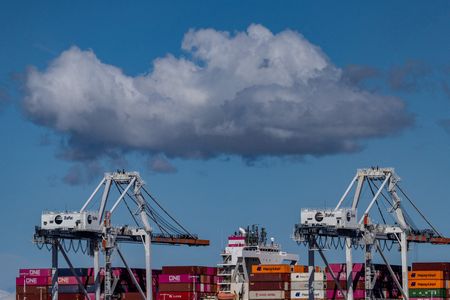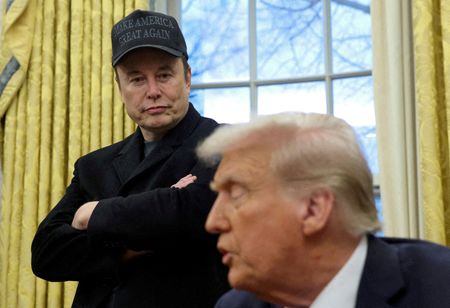By Nandita Bose and Trevor Hunnicutt
WASHINGTON (Reuters) -The White House confirmed on Tuesday that President Donald Trump will impose new tariffs on Wednesday, though it provided no details about the size and scope of trade barriers that have businesses, consumers and investors fretting about an intensifying global trade war.
Trump has for weeks trumpeted April 2 as a “Liberation Day” that will see dramatic new duties that could upend the global trade system, with a White House Rose Garden announcement scheduled for 4 p.m. Eastern Time (2000 GMT).
White House spokeswoman Karoline Leavitt said reciprocal tariffs on countries that impose duties on U.S. goods would take effect immediately after Trump announces them, while a 25% tariff on auto imports will take effect on April 3.
Treasury Secretary Scott Bessent told Republican House lawmakers that the reciprocal tariffs Trump will announce represent a “cap” of the highest U.S. tariff level that countries will face and could go down if they meet the administration’s demands, according to Republican Representative Kevin Hern from Oklahoma.
Trump has already imposed tariffs on aluminum and steel imports and has increased duties on all goods from China. But he has also repeatedly threatened to impose other tariffs, only to cancel or postpone them.
Leavitt’s announcement indicated that he plans to plow ahead this time. “The president has a brilliant team of advisors who have been studying these issues for decades, and we are focused on restoring the golden age of America,” she said at a press briefing.
Trump’s determination to press ahead comes amid growing indications that the broad uncertainty being generated by his extensive focus on tariffs is eroding investor, consumer and business confidence in ways that could slow activity and drive up prices.
Economists at the Federal Reserve Bank of Atlanta said a recent survey showed corporate financial chiefs expected tariffs to push their prices higher this year while cutting into hiring and growth.
Hard details of what Trump will unveil on Wednesday remained unclear. According to the Washington Post, aides are considering a plan that would raise duties on products by about 20% from nearly every country, rather than targeting certain countries or products. The administration anticipates the new duties could raise more than $6 trillion in revenue that could be sent on to Americans as a rebate, the paper reported.
Meanwhile, the Wall Street Journal, citing people familiar with knowledge of discussions, reported the U.S. Trade Representative is preparing the option for an across-the-board tariff on a subset of nations that likely would not be as high as a 20% universal tariff option.
A White House aide said any report ahead of tomorrow’s event is “mere speculation.” Trump’s actions have raised tensions with the United States’ largest trading partners.
Canada has vowed to respond with tariffs of its own. “We will not disadvantage Canadian producers and Canadian workers relative to American workers,” Prime Minister Mark Carney said in Winnipeg.
Carney and Mexican President Claudia Sheinbaum spoke on Tuesday about Canada’s plan to “fight unjustified trade actions” by the U.S., the prime minister’s office said.
“With challenging times ahead, Prime Minister Carney and President Sheinbaum emphasized the importance of safeguarding North American competitiveness while respecting the sovereignty of each nation,” Carney’s office said in a statement.
U.S. companies say a “Buy Canadian” movement is already making it harder for their products to reach that country’s shelves.
Other countries have threatened countermeasures as well, even as they have sought to strike deals with the White House to stave off the tariffs.
It was not clear whether those efforts would succeed ahead Wednesday, but the hope is that they would lead Trump to back down in the coming weeks, according to a person familiar with the conversations.
Trump has argued that American workers and manufacturers have been hurt over the past decades by free-trade deals that have lowered barriers to global commerce and fueled the growth of a $3 trillion U.S. market for imported goods. The explosion of imports has come with what Trump sees as a glaring downside: Massively imbalanced trade between the U.S. and the world, with a goods trade deficit that exceeds $1.2 trillion.
Economists warn his remedy – hefty tariffs – would raise prices at home and abroad and hammer the global economy. A 20% tariff on top of those already imposed would cost the average U.S. household at least $3,400, according to the Yale University Budget Lab.
Signs are already emerging that the U.S. economy is losing momentum due in part to uncertainty fostered by Trump’s chaotic approach to economic policymaking.
A raft of business and household surveys have shown sagging confidence in the economic outlook, citing worries that Trump’s tariffs will lead to resurgent inflation.
Rattled investors have sold stocks aggressively for more than a month, wiping nearly $5 trillion off the value of U.S. stocks since mid-February. Wall Street ended mixed on Tuesday with investors stuck in limbo awaiting details of Trump’s announcement on Wednesday.
The risks are not just isolated to the U.S.
Factories around the world, from Japan to Britain to the United States, saw activity slump in March as businesses braced for Trump’s new tariffs, though some saw a bounce in the race to get goods to consumers before the new measures hit.
U.S. manufacturing activity contracted after two straight months of growth, according to the Institute for Supply Management, and goods producers reported their input costs were the highest in nearly three years. Tariffs were widely cited as the main source of anxiety for factory managers.
“Rising prices while business activity slows imply the economy could be heading into stagflation,” said Jeffrey Roach, chief economist at LPL Financial.
(Reporting by Nandita Bose, Trevor Hunnicutt, Susan Heavey, Bo Erickson and Daniel Burns in Washington; Additional reporting by Gursimran Kaur in Bengaluru and Zoe Law in Toronto, and Steve Holland in Washington; Writing by Andy Sullivan and Brad Brooks; Editing by Dan Burns, Frances Kerry, Chizu Nomiyama, Alistair Bell and Stephen Coates)










